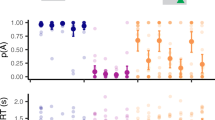Abstract
Experiments in the Set-Shifting Paradigm (SSP) are used to test subjects’ ability to acquire attentional sets and manipulate them. In normal primates, acquisition of discriminations requiring an intra-dimensional shift (IDS) is superior to that requiring an extra-dimensional shift (EDS). Further, damage to the prefrontal cortex is seen to impair EDS performance. We propose a bias theory to account for the IDS-EDS asymmetry. Uniform bias developed for exemplars from the relevant dimension makes it difficult to subsequently acquire exemplars from the previously irrelevant dimension. A neural network model embodying this theory replicates the experimental results. Prefrontal cortex is hypothesised to be involved in reward-based category learning which in turn facilitates EDS performance. Basic processes in neural systems that can support the formation of potentially higher-level representations are pointed out.
Access this chapter
Tax calculation will be finalised at checkout
Purchases are for personal use only
Preview
Unable to display preview. Download preview PDF.
Similar content being viewed by others
References
Roberts AC. Comparison of cognitive function in human and non-human primates. Cognitive Brain Research 1996; 3: 319–327
Kruschke JK. Dimensional relevance shifts in category learning. Connection Science 1996; 8 (2): 225–247
Levine DS, Prueitt PS. Modeling some effects of frontal lobe damage: Novelty and perseveration. Neural Networks 1989; 2: 103–116
Dehaene S, Changeux J-P. The Wisconsin card sorting test: Theoretical analysis and modeling in a neural network. Cerebral Cortex 1991; 1 (1): 6279
Monchi O, Taylor JG. A hard wired model of coupled frontal working memories for various tasks. King’s College London preprint 1997; KCLMTH-97–26
Roberts AC, Robbins TW, Everitt BJ. The effects of intradimensional and extradimensional shifts on visual discrimination learning in humans and non-human primates. Quarterly Journal of Experimental Psychology 1988; 40B: 321–341
Dias R, Robbins TW, Roberts AC. Dissociation in prefrontal cortex of affective and attentional shifts. Nature 1996; 380: 69–72
Sutherland NS, Mackintosh NJ. Mechanisms of animal discrimination learning. Academic Press, New York, 1971
Zeaman D, House BJ. A review of attention theory. In N. R. Ellis (Eds) Handbook of Mental Deficiency, Psychological Theory and Research 2nd Edition, pp. 63–120. McGraw Hill, New York, 1979
Author information
Authors and Affiliations
Editor information
Editors and Affiliations
Rights and permissions
Copyright information
© 1998 Springer-Verlag London Limited
About this paper
Cite this paper
Bapi, R.S., Denham, M.J. (1998). Representational Issues in Neural Systems: Example from a Neural Network Model of Set-Shifting Paradigm Experiments. In: Bullinaria, J.A., Glasspool, D.W., Houghton, G. (eds) 4th Neural Computation and Psychology Workshop, London, 9–11 April 1997. Perspectives in Neural Computing. Springer, London. https://doi.org/10.1007/978-1-4471-1546-5_11
Download citation
DOI: https://doi.org/10.1007/978-1-4471-1546-5_11
Publisher Name: Springer, London
Print ISBN: 978-3-540-76208-9
Online ISBN: 978-1-4471-1546-5
eBook Packages: Springer Book Archive




